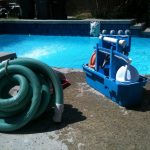Tips for Proper Chemical Storage
Few things compare to a refreshing dip in a luxury pool on a sweltering summer day. The crystal-clear water sparkling around you offers a brief glimpse of paradise. But keeping this paradise functioning requires routine upkeep.
Organizing your chemicals—such as chlorine, water balancers, and bromine tabs—is the first step to ensuring your pool stays clean all summer long. We know you’ve heard it hundreds of times before, but chemicals will keep your pool water safe and clean for swimmers. Therefore, understanding the DOs and DON’Ts of chemical storage remains critical. If chemicals are not properly stored, safety hazards can arise for yourself, your family, and your friends.
The maintenance team at Shoreline Pools understands that chemical treatment is an enormous part of keeping your pool working properly. When storing chemicals at home, here are some general rules of thumb to follow.
Keep Chemicals Sealed in the Original Containers
Certain chemical compounds can cause costly damages, so you’ll want to avoid them. These products include calcium hardness increasers and sodium bicarbonate; pool shock and enzyme products; and chlorine and calcium hypochlorite. Mixing these compounds will cause chemical reactions that can result in catastrophic fires, explosions, and the release of chlorine gas.
Chlorine gas can cause fluid build-up in the lungs causing pulmonary edema and when direct contact occurs, liquid chlorine can cause frostbite of the eyes or skin. By keeping pool chemicals in their original containers, regardless of their likelihood to react with other chemicals, you can avoid the aftermath of chemical reactions. Additionally, try using separate scoopers when removing chemicals from containers. Even the slightest traces of other chemicals may react with each other, resulting in possible chaos.
Store Chemicals in a Cool, Dry, Well-Ventilated Place
According to pool experts, you should always store your pool chemical in a cool, dry place. In excessive heat and humidity that we typically see in summer, chemicals will expand within their containers and can cause leakages. Expansion occurs when chemical substances in heat cause molecules to vibrate quickly, creating more space between each particle.
But in more frigid environments, chemicals may separate and become less effective in cleaning your pool. A temperature-controlled environment is an ideal place to store chemicals and prevent gas leaks or chemical infectivity.
Stray Away from Stacking Containers
Stacking containers increases the risk that chemicals may seep into other canisters, causing hazardous chemical reactions. People will often stack items to optimize storage space. But when heavy containers are stacked on top of one another, the possibility of these containers breaking increases.
Stacked containers falling into one another or hairline cracks in containers can cause chemical mixing, which can pose dangerous conditions. Having a space large enough to keep all containers separate from one another is imperative to maintain a safe storage environment, such as a well-ventilated and temperature-controlled shed.
Avoid Water-Prone Storage Areas
Areas prone to moisture are not suitable places to store chemicals. Areas prone to flooding, exposed outdoor areas susceptible to rain, or nooks underneath water pipes are all unsuitable areas for chemical storage. When water mixes with chemicals, especially chlorine, corrosion and the release of noxious gases may occur. The best storage place for your pool’s chemicals is in a humid-free and water-free environment, such as a temperature-controlled basement or in a ventilated-pump room.
Secure Your Chemical Storage Area
A CDC study conducted between 2008 and 2017 found that over 4,500 people visited the emergency room due to pool chemical-related injuries. More than one-third of these patients were children. The accidental ingestion or inhalation of pool chemicals by children and pets can cause severe illness or death. To prevent these awful incidents, remember to store pool chemicals in a place inaccessible to children or pets. Chemical storage areas should be locked and secured after every entry to keep little ones and furry friends from dangerous encounters.
Organize Your Pool Chemicals
Knowing where each chemical is within your storage room is imperative. If labels or identifying markers on chemical storage containers are not legible, avoid guessing what’s in the container; it’s much safer to discard the chemical and buy a new container when necessary. After a purchase, if the label is still not clear enough to understand what is in the container, consider marking the container with a taped sticky note or index card.
Let Shoreline Pools Safely Manage Your Pool Chemicals
Taking precautions by properly storing pool chemicals prevents accidents before they can happen. If you’re looking for a safe and easy chemical treatment process, look no further than Shoreline Pools’ maintenance service packages to ensure balanced pool chemistry all season long. Whether you are looking for full-service maintenance packages or basic pool care plans, Shoreline Pools has you covered.
Our service professionals will ensure your backyard remains a safe environment for you and your guests, no matter the season. To inquire about our maintenance service plans, dial (203) 357-1544 today. Don’t forget to subscribe to Shoreline Pools on HOUZZ for sneak peeks of our latest pool projects.





